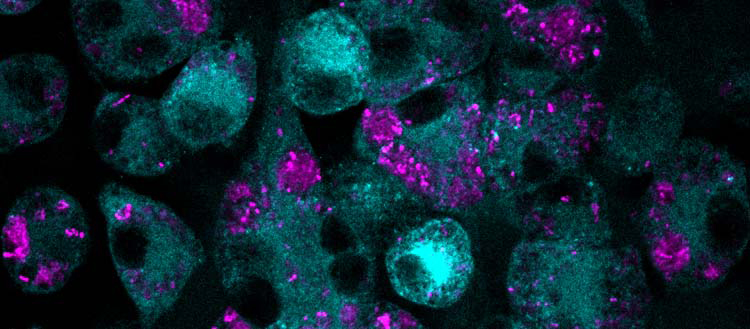By combining an antibiotic with an anti-cancer agent, an international team has developed a treatment capable of circumventing the antibiotic resistance of the bacterium Enterococcus faecalis.

A confocal microscopy image of macrophages treated with MTX (cyan) that have eaten bacteria (magenta). © Singapore-MIT Alliance for Research and Technology (SMART)
Antibiotic resistance is one of the world's most pressing health challenges: in 2019, nearly 5 million people died from an infection associated with or attributed to antibiotic resistance. A research consortium involving the Singapore-MIT Alliance for Research and Technology (SMART), the Singapore Centre for Environmental Life Sciences Engineering (SCELSE), Nanyang Technological University (NTU), the Massachusetts Institute of Technology (MIT) and the University of Geneva (UNIGE) has tackled the potentially deadly Enterococcus faecalis bacterium, most strains of which have developed resistance to common antibiotics. The scientists have developed an innovative strategy that consists of adding mitoxantrone, an anti-cancer agent, to vancomycin, the main antibiotic used in this context. The combination of these two drugs targets simultaneously the bacteria and the human immune system, and circumvents resistance. These promising results can be read in the journal Science Advances.
Enterococcus faecalis is a very common bacterium that causes many infections. It readily becomes resistant to key antibiotics, becoming vancomycin-resistant Enterococcus faecalis (VRE), which is dangerous because few truly effective drugs currently exists. In clinical settings, this bacterium causes urinary tract, bloodstream, and wound infections associated with catheters or surgical procedures.
''In view of increasing antibiotic resistant infections, it is becoming urgent to propose innovative approaches to eliminate these microbes,'' emphasises Kimberly Kline, professor in the Department of Microbiology and Molecular Medicine at the UNIGE Faculty of Medicine and principal investigator at SMART, who co-directed this work. ''Antibiotics are designed to kill bacteria, which can then develop resistance to defend themselves. To bypass this resistance mechanism, we wanted to examine other control strategies, such as strengthening the immune system of patients to fight bacterial infections more effectively."
A new use for an anti-cancer drug
Mitoxantrone is a drug used in the treatment of certain cancers - acute leukaemia, prostate and breast cancer - as well as for multiple sclerosis. The research team tested the efficacy of mitoxantrone against VRE, both in vitro and in vivo, alone and in combination with vancomycin. ''The potent combination between MTX and vancomycin that we discovered, is highly effective in inhibiting the growth of VRE,'' said co-author Jianzhu Chen, a senior researcher at SMART and professor of biology at the Koch Institute for Integrative Cancer Research at MIT. ''Furthermore, it also possesses the ability to strengthen the host immune system and improve wound healing by recruiting more immune cells to sites of infection and making immune cells more capable of killing bacteria.''
''Our team's breakthrough in the discovery of mitoxantrone as a highly effective dual bacterium- and host-targeted therapy against VRE represents a major step forward in the fight against VRE infections,'' added Ronni da Silva, first author of the paper and a postdoctoral researcher at SMART.
Clinical trials in preparation
Scientists are currently conducting pre-clinical studies in preparation for a clinical trial specifically aimed at developing local treatments for chronic diabetic wound infections. ''Our research provides a solid basis for exploring the potential impact of using mitoxantrone in the treatment of bacterial infections. By exploring a range of applications, we aim to provide entirely new therapeutic strategies to combat resistant pathogens,'' concludes Kimberly Kline.






